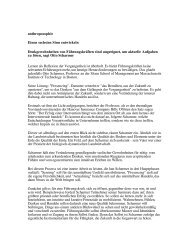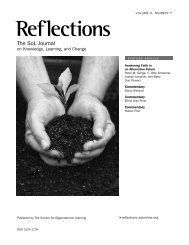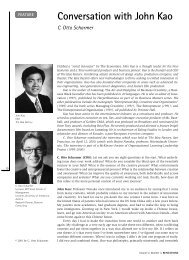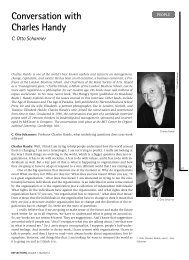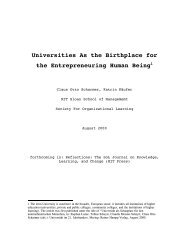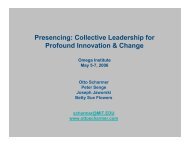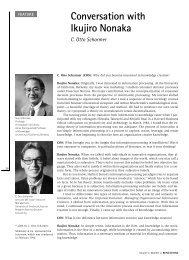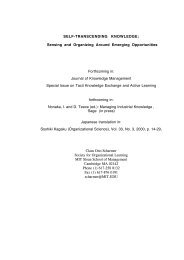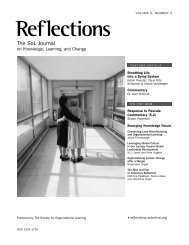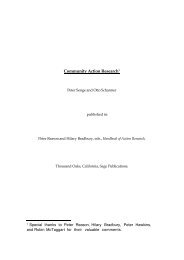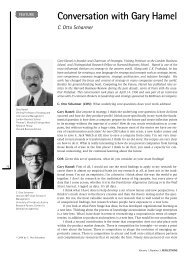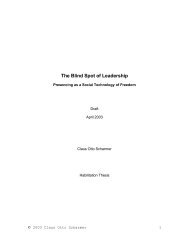Leading from the Emerging Future Minds for Change - Otto Scharmer
Leading from the Emerging Future Minds for Change - Otto Scharmer
Leading from the Emerging Future Minds for Change - Otto Scharmer
You also want an ePaper? Increase the reach of your titles
YUMPU automatically turns print PDFs into web optimized ePapers that Google loves.
I was invited by <strong>the</strong> Ministry of Health and Social Services in Namibia to facilitate a<br />
workshop with <strong>the</strong> national cabinet. The ministers and deputy ministers explained<br />
<strong>the</strong>ir circumstances to me as follows: They said, “Look, here is what we face. We<br />
have all <strong>the</strong>se long-‐term and short-‐term planning processes, and yet we know that<br />
our governmental system and <strong>the</strong> services that we deliver are largely disconnected<br />
<strong>from</strong> <strong>the</strong> real needs in <strong>the</strong> communities. We also have a disconnect between <strong>the</strong><br />
political leadership and <strong>the</strong> civil servants. And <strong>the</strong> third problem we have is that we<br />
work in isolated silos among all our Ministries that are replicated within our<br />
Ministries as well. What can we do?”<br />
First, we helped <strong>the</strong> Ministry of Health and Social Services to assess <strong>the</strong> problems in<br />
<strong>the</strong>ir own system. They identified a number of bottlenecks. After that, <strong>the</strong>y<br />
requested a leadership capacity-‐building program <strong>for</strong> <strong>the</strong> team at <strong>the</strong> top, which our<br />
team provided as a quarterly leadership development <strong>for</strong>um. We also facilitated a<br />
multi-‐stakeholder project that focuses on maternal health.<br />
In <strong>the</strong> “sensing phase” of <strong>the</strong> maternal health project, <strong>the</strong> project team went into <strong>the</strong><br />
field to experience <strong>the</strong> system firsthand by walking in <strong>the</strong> shoes of all <strong>the</strong> key<br />
stakeholders, including <strong>the</strong> frontline nurses and remote patients. They came back<br />
and shared what <strong>the</strong>y learned with <strong>the</strong> o<strong>the</strong>rs.<br />
Then <strong>the</strong> team moved into <strong>the</strong> “presencing phase”. In a retreat, <strong>the</strong>y reflected deeply<br />
on everything <strong>the</strong>y had learned in <strong>the</strong> sensing phase and how it related to <strong>the</strong>ir own<br />
journey. They connected with <strong>the</strong> deeper personal contexts and stories that each<br />
person brings. They also realized how much <strong>the</strong>ir own story was interwoven with<br />
<strong>the</strong> evolutionary challenges of <strong>the</strong>ir health system. In <strong>the</strong> concluding part of <strong>the</strong><br />
retreat <strong>the</strong>y developed five prototyping initiatives that focused on three main areas:<br />
access, capacity building, and user mindsets.<br />
They tested and developed <strong>the</strong>se prototyping ideas in one region. Then <strong>the</strong>y took<br />
<strong>the</strong> best ideas that came out of that first round of prototyping work and applied<br />
<strong>the</strong>m to o<strong>the</strong>r regions in <strong>the</strong> country. To date, half <strong>the</strong> regions in <strong>the</strong> country are in<br />
<strong>the</strong> process of implementing <strong>the</strong>se institutional and practical innovations, including<br />
<strong>the</strong> creation of a cross-‐functional and cross-‐organizational innovation hub called a<br />
“regional delivery unit” that brings toge<strong>the</strong>r key decisionmakers every week in<br />
order to support fast-‐cycle prototyping and learning.<br />
What we discovered toge<strong>the</strong>r in Namibia was that <strong>the</strong> leaders of <strong>the</strong> system needed<br />
to go on a journey of trans<strong>for</strong>ming <strong>the</strong>ir connections with each o<strong>the</strong>r, with <strong>the</strong> larger<br />
system, and with <strong>the</strong>mselves.<br />
The three divides that mark our current global crisis are an expression of a required<br />
next step in evolving our institutions of government, business, and civil society.<br />
In terms of our economic development, we have moved <strong>from</strong> a 1.0 stage of<br />
centralized single-‐sector economies to a 2.0 stage that gave rise to <strong>the</strong> private sector



